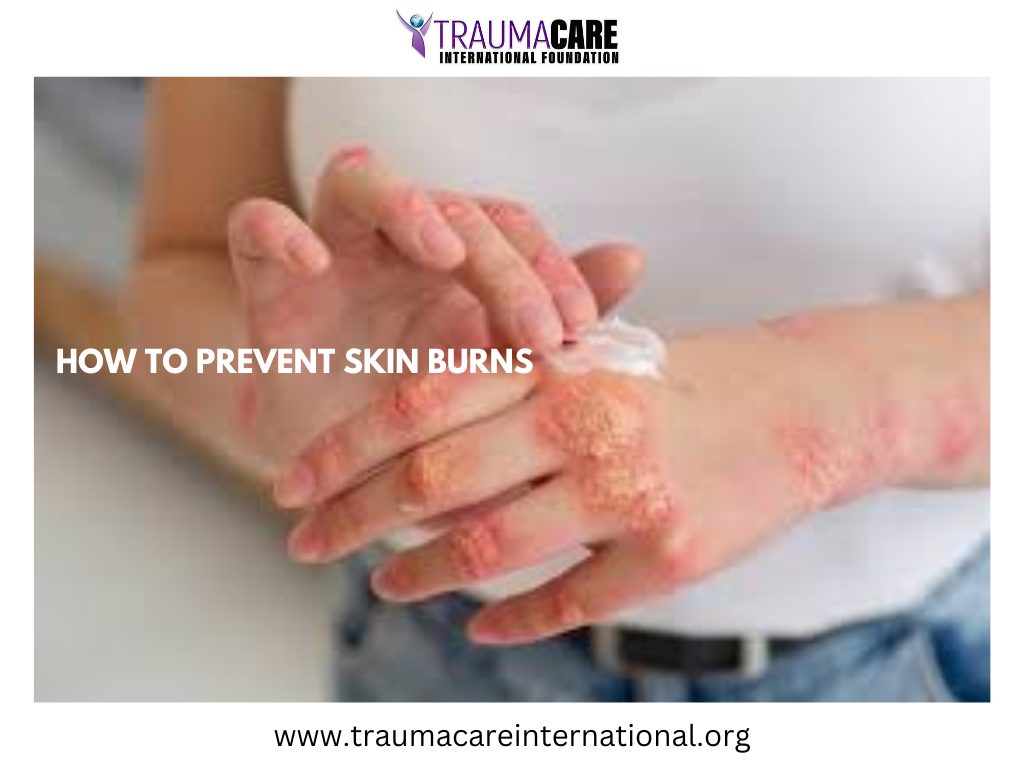Skin burns can occur due to various causes, including heat, chemicals, electricity, and radiation. Here are some general tips to help prevent skin burns:
1. Practice sun safety: Protect your skin from the sun's harmful ultraviolet (UV) rays by wearing sunscreen with a high SPF, using protective clothing, and seeking shade during peak sunlight hours.
2. Use caution around heat sources: Be cautious when handling hot objects, such as hot pans, irons, or curling irons. Use oven mitts or appropriate protective gear to avoid thermal burns.
3. Install smoke detectors and fire extinguishers: Take precautions to prevent fires in your home or workplace. Install smoke detectors, maintain them regularly, and keep fire extinguishers in easily accessible areas.
4. Be careful in the kitchen: Use oven mitts or potholders when handling hot items, and be cautious when cooking with oil or boiling liquids to avoid splatters and burns.
5. Handle chemicals safely: When working with chemicals, read and follow the instructions carefully. Wear appropriate gloves, goggles, and protective clothing to minimize the risk of chemical burns.
6. Practice electrical safety: Avoid overloading electrical outlets, use electrical appliances with caution, and keep them away from water sources. If you notice any faulty wiring or electrical issues, have them addressed by a professional.
7. Be aware of hot water temperatures: Set your water heater thermostat to a safe temperature to prevent scalding burns, especially in bathrooms and kitchens.
8. Stay hydrated: Proper hydration can help maintain healthy skin, making it less prone to burns and injuries.
9. Educate yourself and others: Be aware of potential burn hazards in your environment and educate yourself and those around you about burn prevention and first aid.
10. Have a first aid kit: Keep a well-stocked first aid kit at home, in your car, and at your workplace. Familiarize yourself with basic first aid procedures for treating burns.
11. Practice electrical outlet safety: Cover unused electrical outlets with safety caps or outlet covers to prevent young children from inserting objects and getting burned.
12. Be cautious with hot liquids: Take extra care when handling hot liquids like coffee, tea, or soup. Use double-walled or insulated containers to help maintain the temperature and avoid accidental spills or scalds.
13. Be mindful of hot surfaces: Be cautious around hot surfaces such as stovetops, grills, or heaters. Use appropriate protective gear and keep a safe distance to prevent burns.
14. Use caution with fireworks: If you're using fireworks, follow local laws and safety guidelines. Keep a safe distance, never handle malfunctioning fireworks, and have a bucket of water or a fire extinguisher nearby.
15. Wear protective gear: Depending on your activities, wear appropriate protective gear such as gloves, long-sleeved shirts, pants, and closed-toe shoes to minimize the risk of burns from hot objects or chemicals.
16. Exercise caution when using heating devices: Use heating devices like curling irons, straighteners, or space heaters with caution. Keep them away from flammable materials, unplug them when not in use, and follow manufacturer instructions.
17. Be cautious during outdoor activities: If you're engaging in activities like camping, hiking, or cooking outdoors, be cautious around open flames, campfires, and grills. Follow safety guidelines and maintain a safe distance.
18. Check water temperature: Before bathing or using hot tubs, test the water temperature to ensure it's not too hot. This is especially important for young children and older adults, who may be more sensitive to burns.
19. Be careful with hot surfaces in vehicles: During hot weather, be cautious when touching surfaces like seat belt buckles, steering wheels, or car seats that may have been exposed to direct sunlight for long periods.
20. Teach children about burn prevention: Educate children about the dangers of burns and how to prevent them. Teach them to be cautious around hot objects, open flames, and other burn hazards.
Remember, prevention is key, but accidents can still happen. If you or someone else sustains a burn, it's vital to know basic first aid for burns, such as cooling the burn with cool (not cold) running water, covering it with a clean, non-stick dressing, and seeking medical attention if necessary.
For more information;
Call: +234808 678 3416 or +2348136427927
[email protected] CLICK HERE TO SIGN UP
Download the TCERA user app today.
https://bit.ly/tceraAndroid
https://bit.ly/tcera-IOS





What do you think?
0 Responses
To Comment, you must Sign In
Be the First to Post on this Topic